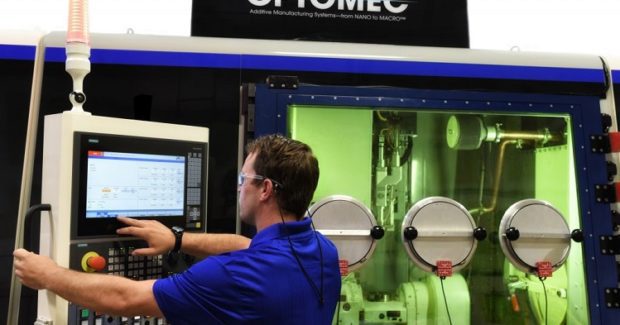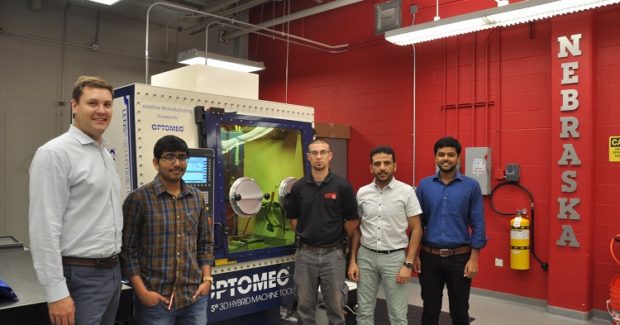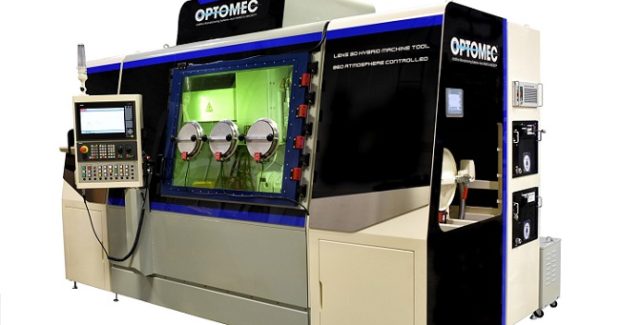Hybrid Additive Manufacturing of Dissolvable Metal Components for Medical Implants
UNL is using a LENS 860 Hybrid Controlled Atmosphere system from Optomec for high quality additive and subtractive processing of magnesium to develop dissolvable components for next-generation medical implants.
Posted: October 30, 2018
In a breakthrough that will eliminate the need for second surgeries and reduce risks, costs and suffering for patients, Optomec Inc. (Albuquerque, NM) has unveiled details of how the University of Nebraska-Lincoln (UNL) is using their LENS™ Hybrid Controlled Atmosphere (CA) system to develop dissolvable magnesium components that will have broad-reaching implications in the design and manufacture of next-generation medical implants. This groundbreaking work will build 3D printed, patient-specific implants with controlled time to dissolve, eliminating the need for second surgeries. The LENS 3D Hybrid CA system is the industry’s first and only atmosphere-controlled system for additive and subtractive processing of metals, including titanium and aluminum. LENS hybrid technology combines a rugged CNC automation platform with industry-proven LENS technology, lowering acquisition cost to bring metal additive manufacturing capabilities to industrial markets.
“We are proud to be the first customer of a LENS Hybrid CA system, the only commercially-available machine to provide hybrid manufacturing capabilities for reactive metals,” said Dr. Michael Sealy, an assistant professor of mechanical and materials engineering at UNL and a pioneer in advanced manufacturing research. “Our research is focused on advancing the performance and functionality of dissolvable devices. Using LENS, we are applying a hybrid additive manufacturing process to control the disintegration of medical fasteners and plates so they stay in-tact long enough to serve their purpose and then degrade away once the bone is healed.” Currently, medical implants – such as plates and screws – are made of titanium or stainless steel, which are permanent structures that often have high complication rates and require a second surgery for removal. By using the LENS Hybrid CA system to print patient-specific magnesium implants with a controlled time to dissolve, Dr. Sealy’s team is helping to change all of that.
“Dr. Sealy’s pioneering work enables the design and manufacture of components with a combination of properties unobtainable using traditional metal working methods,” noted Tom Cobbs, the LENS product manager at Optomec. “We applaud his innovative use of hybrid additive manufacturing to create and qualify a new class of metal components with unique properties that will benefit mankind.” Powdered metals, such as magnesium, titanium and other reactive materials, must be processed in a controlled atmosphere environment where oxygen and moisture impurities are maintained below 10 ppm. Dr. Sealy used the LENS 3D Hybrid CA system to process these materials in a way that addresses a key scientific challenge: how to maintain the strength and integrity of a degradable implant long enough for it to do its job. Partnered with Sentient Science (Buffalo, NY), Dr. Sealy is also investigating innovative hybrid processing techniques of 7000 series aluminum for the Navy.
The LENS Hybrid CA system enables Sealy and his team to couple LENS deposition technology with layered surface treatments to print 3D metal components in magnesium with controlled degradation. The ability to control disintegration of a structure is a highly sought-after design capability – not only for applications in orthopedics, cardiology, and urology but also for other applications areas such as lightweight aerospace and automotive structures. In response, Optomec has launched their LENS 860 Hybrid CA system with a larger build volume that supports higher laser power, providing more capabilities for affordable, high quality metal hybrid manufacturing. This system has an 860 mm x 600 mm x 610 mm work envelope, is equipped with a hermetically-sealed build chamber that maintains oxygen and moisture levels below 10 ppm for processing reactive metals, such as titanium. It can be configured with closed loop controls and a high-power 3 kW fiber laser, making it ideal for building, repairing or coating mid-to-large size parts with superior metal quality.
One key advantage of the LENS Hybrid configuration is the ability to use the milling capability to perform finish machining on a printed part without re-fixturing or aligning the component on a second machine. The LENS Machine Tool Series continues to lead the industry in cost to performance with a starting price of under $250,000. The LENS 860 Hybrid CA system can produce and repair larger parts cost effectively and also provides versatility, with the ability to print fine features for thin wall structures and perform wide area cladding for wear coating applications. Powerful Optomec software enables 5-axis build strategies that combine additive and subtractive operations in a single tool path. A range of material starter recipes are available to help speed adoption with the LENS 860 Hybrid CA system. (Note: LENS is a registered trademark of Sandia National Labs)
Optomec Inc., 3911 Singer NE, Albuquerque, NM 87109, 505-761-8250, Fax: 505-761-6638, www.optomec.com.






